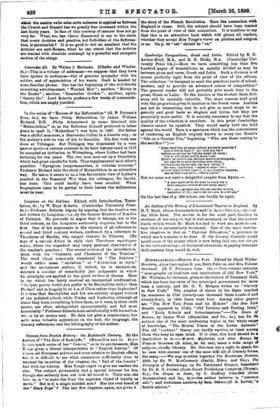Cambridge Compositions, Greek and Latin. Edited by R. D. Archer-Hind,
MA., and R. D. Hicks, M.A. (Cambridge Uni- versity Press 12s.)—Here we have something less than five_ hundred pages of translations, as equally divided as may be between prose and verse, Greek and Latin. Such a division is of course perfectly right from the point of view of the editors. The collection "is designed to meet the practical needs of school- masters, and to provide an advanced course of composition." The general reader will not probably give much time to the prese, Greek or Latin. To the teacher or the student these divi- sions will be specially valuable. The same reasons hold good with the proportion given to iambics in the Greek verse. Iambiais are not so interesting, and do not give so much scope to in- genuity and good taste as elegiacs and lyrics, but they are practically more useful. It is scarcely necessary to say that the quality of the collection is excellent. In this point Cambridge classics cannot be equalled. They would easily hold the field against the world. Here is a specimen which has the convenience of rendering an English original known to every one Keats's " Ode on a Grecian Urn," beginning " Who are these coming to the sacrifice ?") :- " Qaae vent hue ad score oobore, borrende eacardoe P
quisve bovans duct. P con virot era deo P osmium au.pic•ens en vial= nitwit ad auras ;
Una ii (Mt plash' mollia terse rugs Qood r ar onnidninat, flU,i0713 marine propinqnnm, ant plac.da in Belie montibus arcs situm, civinus a cumdis soIrmai bac lure • °ling.' P sic .reo, oppiaulum. n tapas in own' *lea ;
sic rat inane foram noon o; n qua nuntins august's, qua sis deset tam sorb-, referre potast."
But we must not omit a delightful couplet from Byron :-
" A man must serve his tine to every tra fe Save censure—critics all are ready made."
" EP% putn, gu;sque sus tiro ex.rcendas in erte, nasotintur cr,tic., nee bullet ceumra m On the last line of p 289 livapihri can hardly be right.






































 Previous page
Previous page